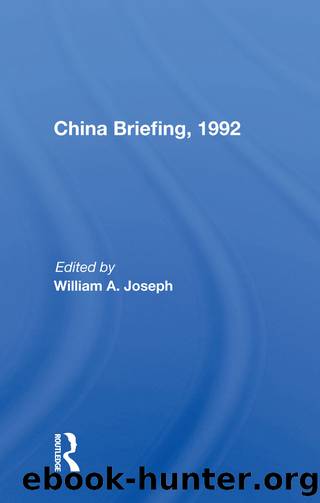China Briefing, 1992 by William A. Joseph

Author:William A. Joseph [Joseph, William A.]
Language: eng
Format: epub
Tags: Social Science, Political Science, World, Asian, Regional Studies
ISBN: 9780813316031
Google: m9KpDwAAQBAJ
Goodreads: 15305914
Publisher: Westview Press
Published: 1992-12-01T00:00:00+00:00
Law and Rights in the Chinese Context
Even beyond bureaucracy, party dominance, and the preference for informality in legal affairs, any understanding of rights in the Chinese system requires an examination of the differing conceptions of rights and law in Chinese tradition and culture and of the philosophical underpinnings of the Chinese legal system. The failure to address or to reconcile the reality of cultural and philosophical differences between China and the West has sometimes led to self-righteous and unproductive discourse about human rights that has been interpreted by the Chinese as cultural imperialism. On the other hand, understanding how the Chinese conceive of rights, law, and the legal system can further the task of applying universal concepts of human rights to China's social, cultural, and institutional realities.34
China's conception of law and rights is distinctly different from traditional Western concepts, particularly from the concept of natural law and rights. According to the natural law view, certain rights are, by nature, inherent in the human being and cannot be transgressed by the state or others. Human rights, under this conception, are held by individuals as against competing claims by the state and society.
By contrast, Chinese legal philosophy defines "law as the state's will and rights as the state's creation."35 Rights may be expanded and contracted at will by the state on the basis of the needs of the collective. Under this view of law and rights, the Chinese people are free because state laws represent the will of the proletariat, which is in turn (theoretically) represented by the Chinese Communist Party, while laws in capitalist societies reflect only the will of the ruling class, the capitalist owners of the means of production.
According tο Andrew Nathan, this view stems not only from the Marxist concept of law as an instrument of the ruling class, but from the traditional Confucian ethic of selflessness.36 The Confucian tradition emphasizes social harmony and order, often at the expense of individual liberties. In China, persons are viewed primarily as members of a family or a community, rather than as autonomous isolated individuals. Social order and harmony are achieved when each person understands and abides by his or her rights as well as obligations in relation to others. "In the Confucian view, a man is born into society and cannot prosper alone: the individual depends on the harmony and strength of the group."37
This tradition is bolstered by Chinese Marxism, which subordinates individual interests to the higher interests of party, class, and nation.38 Hence, Mao wrote, "the individual is an element of the collective. When collective interests are increased, personal interests will subsequently be improved."39 Members of a socialist society should behave selflessly and make sacrifices for the greater good. Chinese Marxism attributes an additional element of class nature to law. As one Chinese scholar has explained, "While Americans understand rights as innate, the Chinese hold that rights are the products of class struggle and are granted by the state. Second, Americans think that rights should be apolitical or non-ideological
Download
This site does not store any files on its server. We only index and link to content provided by other sites. Please contact the content providers to delete copyright contents if any and email us, we'll remove relevant links or contents immediately.
| Anthropology | Archaeology |
| Philosophy | Politics & Government |
| Social Sciences | Sociology |
| Women's Studies |
The Secret History by Donna Tartt(19085)
The Social Justice Warrior Handbook by Lisa De Pasquale(12190)
Thirteen Reasons Why by Jay Asher(8907)
This Is How You Lose Her by Junot Diaz(6885)
Weapons of Math Destruction by Cathy O'Neil(6279)
Zero to One by Peter Thiel(5801)
Beartown by Fredrik Backman(5751)
The Myth of the Strong Leader by Archie Brown(5507)
The Fire Next Time by James Baldwin(5442)
How Democracies Die by Steven Levitsky & Daniel Ziblatt(5218)
Promise Me, Dad by Joe Biden(5153)
Stone's Rules by Roger Stone(5087)
A Higher Loyalty: Truth, Lies, and Leadership by James Comey(4960)
100 Deadly Skills by Clint Emerson(4924)
Rise and Kill First by Ronen Bergman(4788)
Secrecy World by Jake Bernstein(4752)
The David Icke Guide to the Global Conspiracy (and how to end it) by David Icke(4717)
The Farm by Tom Rob Smith(4507)
The Doomsday Machine by Daniel Ellsberg(4490)
